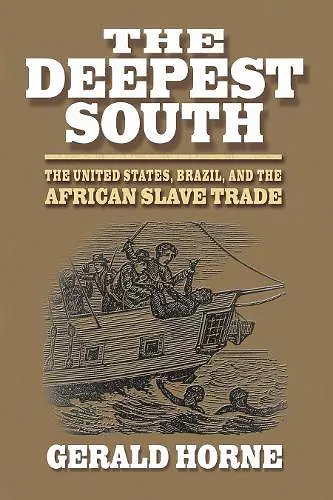The Deepest South
The United States, Brazil, and the African Slave Trade
Format:Paperback
Publisher:New York University Press
Published:1st Mar '07
Should be back in stock very soon

During its heyday in the nineteenth century, the African slave trade was fueled by the close relationship of the United States and Brazil. The Deepest South tells the disturbing story of how U.S. nationals - before and after Emancipation -- continued to actively participate in this odious commerce by creating diplomatic, social, and political ties with Brazil, which today has the largest population of African origin outside of Africa itself.
Proslavery Americans began to accelerate their presence in Brazil in the 1830s, creating alliances there—sometimes friendly, often contentious—with Portuguese, Spanish, British, and other foreign slave traders to buy, sell, and transport African slaves, particularly from the eastern shores of that beleaguered continent. Spokesmen of the Slave South drew up ambitious plans to seize the Amazon and develop this region by deporting the enslaved African-Americans there to toil. When the South seceded from the Union, it received significant support from Brazil, which correctly assumed that a Confederate defeat would be a mortal blow to slavery south of the border. After the Civil War, many Confederates, with slaves in tow, sought refuge as well as the survival of their peculiar institution in Brazil.
Based on extensive research from archives on five continents, Gerald Horne breaks startling new ground in the history of slavery, uncovering its global dimensions and the degrees to which its defenders went to maintain it.
"In The Deepest South, U.S. diplomatic historian Gerald Horne provides a fascinating look at an important topic . . . In eleven chapters marked by significant strengths, the author argues that the histories of the two largest slaveholding nations (the United States and Brazil)of the western hemisphere were closely intertwined throughout the nineteenth century." -- Mary Ann Mahoney * The Americas *
"The Deepest South provides an important and useful examination of the impact of the idea and persistence of Brazilian slavery on American positions on the issue and on the historical trajectory of slavery in the United States." -- Mariana Dantas,Department of History, Ohio University
"A well-researched, skillfully-written, and carefully-argued diplomatic history examining connections between the United States, Brazil, Africa, and Europe as they relate to the transatlantic slave trade. Horne sheds considerable light upon the ideas, ruminations, and practices of U.S. nationals in their interactions with and encounters of Brazil over the question of slavery, especially from the mid-nineteenth century on, and makes a valuable and important contribution to our knowledge and understanding of (American) hemispheric relations and trajectories, both eventual and potential." -- Michael A. Gomez,editor of Diasporic Africa: A Reader
"An important study that starts with the proposition that what happens abroad affects developments in the United States. For the first time we are made aware of the extensive contacts between pro-slavery forces in the United States in the years after the abolition of the slave trade and the promoters of slavery in and the slave trade to Brazil and elsewhere." -- Richard J. M. Blackett,author of Divided Hearts: Britain and the American Civil War
"As befitting such an international study, Horne has exploited a diverse range of archival materials, and his grasp of the historiography is astute. This is no slight achievement, given the breadth of his subject matter." -- Chris Dixon,The University of Queensland, Australia
"Zurchers well structured and exciting study is worthwhile reading for specialists in Caucasus, conflict resolution theory and nationalism." -- Burcu Culhaoglu * International Centre for Black Sea Studies, Athens *
"“Horne, a proven historian and author specializing in African American history, provides a stimulating perspective on slavery in the U.S. and Brazil. In every aspect, Horne has assembled an extraordinary manuscript which is enormously riveting in its breadth and comprehensiveness. A valuable and indispensable investigation, this work constitutes a landmark in historical analysis of the interrelationships among the United States, Brazil, and the African slave trade. Literally radiating with extraordinary historical observations and a host of well thought-out and well presented ideas, is not only of interest to historians, but also scholars of economics and politics. is required reading for all scholars working in the broad field of the African slave trade." * African American Review *
"This fascinating study uses the tools and sources of diplomatic history to examine a sweep of national and international history far beyond the confines of diplomacy. . . . For Horne, the slave trade, rather than slavery, was an explosive political issue much later in the 19th century that is normally understood. Highly recommended." * Choice *
"[Horne] depicts through rich description and numerous examples the many tentacles of the transatlantic slave trade in the nineteenth century." * Journal of Latin American Studies *
"The author depicts through rich description and numerous examples the many tentacles of the transatlantic slave trade in the nineteenth century." * Journal of Latin American Studies *
"The Deepest South is an important reminder of the need to see the rise and fall of transatlantic slavery in hemispheric as well as national perspective." * The Journal of American History *
"Horne expertly interweaves the political views presented in official documents with personal commentary from letters and travel accounts. . . . It is valuable for scholars of U.S. foreign policy due to its coverage of diplomacy between the United States and other nations. This work contributes to the study of U.S. South since Horne details the plans of some southern leaders and planter elites who looked to Brazil as the answer when all was lost in the United States" * The Journal of Southern History *
ISBN: 9780814736890
Dimensions: unknown
Weight: 476g
341 pages